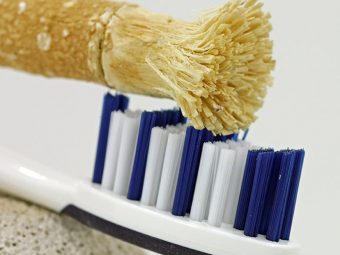10 Best Ways To Keep Your Vagina Clean And Healthy
Quick and efficient methods to keep everything "down there" fresh and healthy.

The vagina is a self-cleaning organ that is home to essential bacteria that keep several infections at bay. But it doesn’t mean you give personal hygiene a toss. Following some simple tips for vaginal hygiene can keep it happy and smelling great. If your vagina doesn’t smell nice and is causing you pain, they may be signs of an infection, and need medical intervention immediately. In this article, we take you through some of the healthy tips you can practice to keep everything amazing down there and prevent related diseases. Keep reading to know them.
In This Article
What Causes Vaginal Infections?
Note: The term ‘vaginitis’ is used to describe the conditions that may cause inflammation or infection of your vagina. The term ‘vulvovaginitis’ is used to describe inflammation of both your vagina and vulva (the external part of your genitals).
The common causes of vaginal infections are:
- Bacterial infections – Overgrowth of certain bacteria that are already found in your vagina can trigger bacterial vaginosis.
- Yeast infections – Infections caused by a fungus called Candida albicans.
- Protozoan parasite – It may cause a vaginal infection called trichomoniasis.
- Menopause – It can cause vaginal atrophy that may result in vaginal thinning and dryness.
- Irritants – Certain soaps, body washes, perfumes, and vaginal contraceptives can cause vaginal irritation. Tight clothing can also trigger rashes and inflammation of the vagina. Think about thongs!
These are some of the major triggers of vaginal infections and irritation. Before we discuss the natural ways to keep your vagina healthy, let’s understand what feminine pH is.
What Is Feminine pH?
Normal vaginal or feminine pH is supposed to be between 3.8 and 4.5. pH is the measurement of how acidic or basic a substance is. The pH scale runs from 0 to 14. A pH of less than 7 is acidic, whereas, a pH of above 7 is considered basic.
Your vaginal pH should ideally be acidic. However, this value may show some changes before menstruation and after menopause.
A high vaginal pH level, say about 4.5, provides the perfect platform for vaginal infections. The common causes of unbalanced feminine pH are:
- Unprotected sexual intercourse
- Antibiotics
- Douching
- Menstrual flow
Since an unbalanced vaginal pH can trigger vaginal infections and irritation, it is important to keep your vagina healthy.
Listed below are some of the best ways that can help you.
Best Ways To Keep Your Vagina Healthy
- Use A Condom
- Take Oral Probiotics
- Avoid Douching
- Eat Healthily
- Use Lubricant During Intercourse
- Choose Your Clothing Carefully
- Follow Good Hygiene
- Treat The Infections
- Avoid Overusing Antibiotics
- Get Gynec Tests Done Regularly
How To Keep Your Vagina Healthy
1. Use A Condom
Using a condom whenever you indulge in sexual intercourse is very important. Use protection to prevent invisible sexually transmitted infections like HIV, genital herpes, gonorrhea, genital warts, and chlamydia (1).
2. Take Oral Probiotics
Consuming probiotics helps to restore the lost good bacteria in your vagina. You can either consume probiotic-rich foods like yogurt and kefir or take supplements (2).
3. Avoid Douching
Your vagina is like a self-cleaning oven. Douching it can disturb its pH – and this may lead to vaginal infections, tubal pregnancy, preterm birth, and other complications (3). Hence, avoid douching. Instead, wash the outside of the vagina with mild soap and water. You may also use any pH-balanced cleanser that is specially formulated for your privates. But make sure it doesn’t have irritating preservatives.
4. Eat Healthily
A healthy and well-balanced diet also has a vital role to play in maintaining your vaginal health. Some foods like yogurt and honey can help prevent yeast infections (4). Cranberry juice was found to help prevent urinary tract infections (5).
5. Use Lubricant During Intercourse
Lubrication during sexual intercourse is important to prevent the skin of the vagina from getting chapped and irritated. Vaginal lubrication is supposed to happen during arousal, but some women do not produce enough of it or not enough time is spent on foreplay. In such instances, natural, external lubricants should be used, such as aloe vera gel. However, do not use petroleum jelly or baby oil as they can trigger vaginal inflammation.
6. Choose Your Clothing Carefully
Wearing tight-fitting clothes can cause irritation and inflammation of the vagina. If you wear wet clothes, like a bathing suit, for a prolonged period, it may create a warm/moist condition for yeast infections to thrive. Hence, wear undergarments that fit you well. Also, make sure that you change out of wet/sweaty clothing as soon as you can.
7. Follow Good Hygiene
Not following good hygiene practices may create a conducive environment for vaginal infections to thrive. Make sure that you clean your privates every time you use the loo. Avoid wearing sanitary pads/tampons for long hours and keep changing them frequently to prevent vaginal irritation. A not uncommon vaginal discharge can occur if you “forget” that you have a tampon in your vagina and insert another one!
8. Treat The Infections
Don’t leave a vaginal infection untreated and wait for it to resolve on its own. If you are prone to yeast infections, you may use any over-the-counter medications to treat it. But if the symptoms are not improving, don’t hesitate to consult a doctor.
9. Avoid Overusing Antibiotics
As we have already discussed, antibiotics are one of the leading causes of an imbalance in the vaginal pH. They can kill the good bacteria along with the bad bacteria in your body. Hence, keep a close tab on the medications you take. Stop overusing antibiotics. Talk to your doctor in case you need to use prescription antibiotics. Make sure your vaginal infection is truly due to bacteria before accepting antibiotics and try to use an antibacterial douche or before taking an oral medication.
10. Get Gynec Tests Done Regularly
See your gynecologist or healthcare provider regularly to keep a close tab on your vaginal health. Get regular gynecological exams or Pap tests to detect any abnormality or infection at the earliest.
These tips may seem quite basic, but they have a huge role to play when it comes to maintaining your vaginal health. They will also assist you in speeding up the recovery of any existing vaginal infection.
Maintaining the right vaginal pH is important to keep it healthy and free from infections. A change in discharge color and texture, or itchiness and a foul odor may hint at a possible infection. Ensuring proper airflow, keeping it dry, protection during intercourse, and taking antibiotics when required would help prevent things from getting worse. Consult a doctor if things don’t seem to be getting better in a couple of days.
Frequently Asked Questions
What does a healthy vagina smell like?
Most healthy vaginas have a mild and natural smell. If the smell of your vagina is extremely off-putting, it may indicate a vaginal infection.
Why is female hygiene important?
Factors like sweating, menstruation, and vaginal discharge make it necessary to maintain good female hygiene to avoid foul odor and maintain vaginal health.
How do I get rid of the feminine odor?
Start by following good hygiene practices if you want to get rid of vaginal odor. Avoid using soaps/body foams on your privates. Instead, choose a pH-balanced cleanser to keep your vagina healthy and clean. See a doctor if the odor persists as it may indicate an infection.
References
- “Effectiveness of condoms in preventing sexually transmitted infections.” Bulletin of the World Health Organization, US National Library of Medicine.
- “Vaginal Microbiota and the Use of Probiotics” Interdisciplinary Perspectives on Infectious Diseases, US National Library of Medicine.
- “Vaginal douching” Journal of Obstetric, Gynecologic, & Neonatal Nursing, US National Library of Medicine.
- “The Comparison of Vaginal Cream of Mixing Yogurt, Honey and Clotrimazole on Symptoms of Vaginal Candidiasis” Global Journal of Health Science, US National Library of Medicine.
- “The role of cranberry juice in the treatment of urinary tract infections.” British Journal of Community Nursing, US National Library of Medicine.
Recommended Articles:
- How To Treat A Vaginal Yeast Infection With A Clove Of Garlic
- 3 Simple Ways To Use Hydrogen Peroxide For Yeast Infection
- 22 Home Remedies That Work To Get Rid Of Vaginal Discharge Odor
- 15 Effective Natural Remedies To Treat Herpes
- Coconut Oil For Candida: Does It Help?











